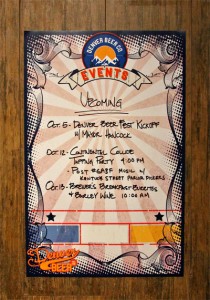
And if you ask any craft brewer what the most important aspect of their business is — beyond quality liquid — a vast majority will tell you that possessing an authentic brand identity is critical to long term success.
It’s something Patrick Crawford, the co-founder of Denver Beer Company which launched 14 months ago on the Northern edge of Denver, knows all too well.
Denver Beer Company opened last August after Crawford and his business partner Charlie Berger raised over $500,000 in startup capital from 27 different investors. The pair outfitted a small, draught-only production facility with a small, 7-barrel brewing system. They currently sell 99 percent of their beer in the company’s tap room; a strategy they say was built into the business plan from day one.
“When we finally decide to roll out cans or bottles, whether that is in Denver or all of Colorado, we want to have that instant pull from the consumer,” Crawford said.
To achieve that “instant pull,” Crawford believes in building the Denver Beer Company brand at the hyper-local level before moving it into broader distribution. It’s a strategy he thinks will be critical for the sustained growth of the company.
“We’ve seen some brands that have cans or bottles on the shelf at liquor stores one day and three weeks later they aren’t there,” Crawford said.
He speculates that those brands overextended themselves, not realizing what demand actually existed in the marketplace. And with the fear of losing a coveted shelf spot in mind, Crawford said he isn’t in a rush to expand the company’s distribution footprint.
It’s a strategy that seems to be paying off.

It’s quite the overnight success story for a startup brewery that has yet to bottle a single beer, so what’s their secret?
Crawford attributes much of the early success to a strong social networking presence through mediums like Facebook and Twitter. Denver Beer Company currently boasts over 11,000 ‘likes’ on Facebook and Crawford believes all those ‘likes’ are translating into actual sales.
“I definitely think the Facebook page makes people more aware of what we are doing and I think our fans are more likely to come in and support us,” he said.

“Charlie and I are trying to create a business that would appeal to people like us,” said Crawford. “We will announce promotional events on Facebook that represent what we are about, which is two fun guys who like to make beer.”
Those events have ranged from a neighborhood hop growing program to discounted beers for anyone willing to brave a snowstorm and drink beers on the brewery patio. Both of those have helped not only to convey the brand’s laidback image but also positively influence the bottom line.
And while the hyper-local business model is working, Crawford knows that in order to continue building a successful business, the company must have aspirations of regional distribution. But for now, he’s content with keeping the beer close to home.
“There are breweries that sell 3,000 barrels of beer in three states,” Crawford said. “Next year we hope to sell 3,000 barrels of beer within just 10 miles.”
